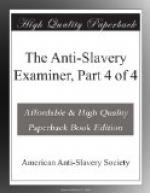“To do a great right, do a little wrong;”
a rule, which the master poet of human nature has rebuked. It is doing evil that good may come—a doctrine, of which an Apostle has pronounced the condemnation.
And let it be remembered that in dealing with the question of slavery, we are not dealing with extreme cases. Slavery is no minute evil which lynx-eyed suspicion has ferreted out. Every sixth man is a slave. The ermine of justice is stained. The national banner clings to the flag-staff heavy with blood. “The preservation of slavery,” says our oldest and ablest statesman, “is the vital and animating spirit of the National Government.”
Surely IF it be true that a man may justifiably stand connected with a government in which he sees some slight evils—still it is also true, even then, that governments may sin so atrociously, so enormously, may make evil so much the purpose of their being, as to render it the duty of honest men to wash their hands of them.
I may give money to a friend whose life has some things in it which I do not fully approve—but when his nights are passed in the brothel, and his days in drunkenness, when he uses his talents to seduce others, and his gold to pave their road to ruin, surely the case is changed.
I may perhaps sacrifice health by staying awhile in a room rather overheated, but I shall certainly see it to be my duty to rush out, when the whole house is in full blaze.
OBJECTION VIII.
God intended that society and governments should exist. We therefore are bound to support them. He has conferred upon us the rights of citizenship in this country, and we cannot escape from the responsibility of exercising them. God made us citizens.
ANSWER. This reminds me of an old story I have heard. When the Legislature were asked to set off a portion of the town of Dorchester and call it South Boston, the old minister of the town is said to have objected, saying, “God made it Dorchester, and Dorchester it ought to be.”




